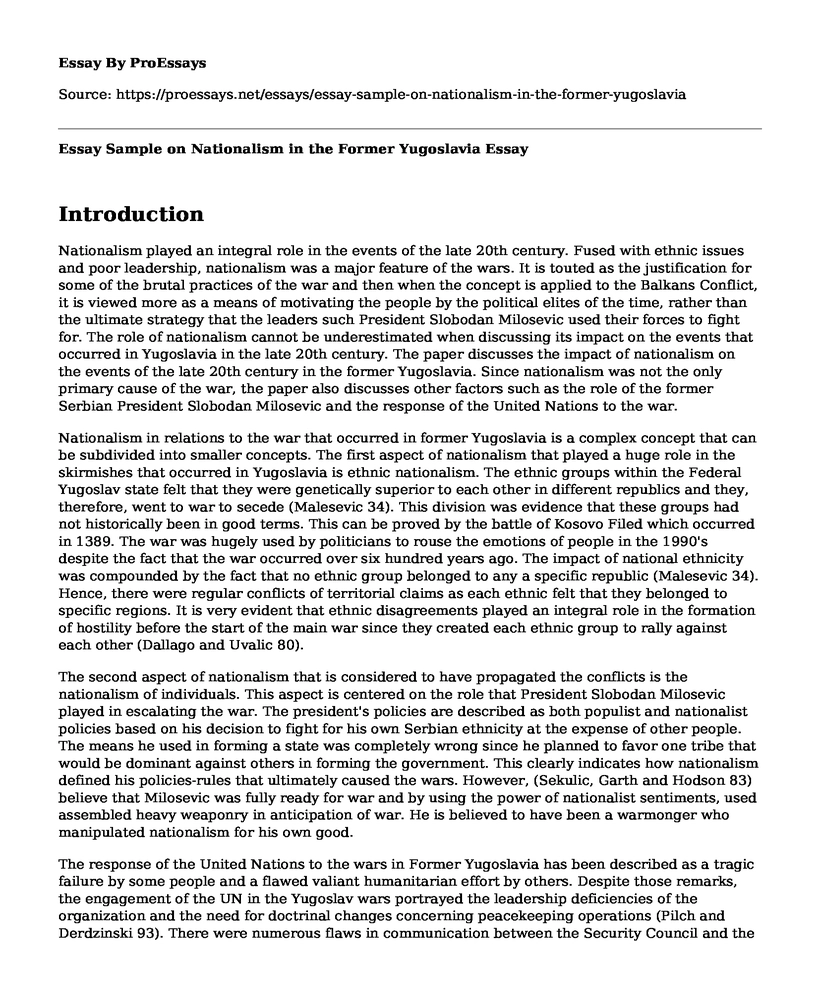Introduction
Nationalism played an integral role in the events of the late 20th century. Fused with ethnic issues and poor leadership, nationalism was a major feature of the wars. It is touted as the justification for some of the brutal practices of the war and then when the concept is applied to the Balkans Conflict, it is viewed more as a means of motivating the people by the political elites of the time, rather than the ultimate strategy that the leaders such President Slobodan Milosevic used their forces to fight for. The role of nationalism cannot be underestimated when discussing its impact on the events that occurred in Yugoslavia in the late 20th century. The paper discusses the impact of nationalism on the events of the late 20th century in the former Yugoslavia. Since nationalism was not the only primary cause of the war, the paper also discusses other factors such as the role of the former Serbian President Slobodan Milosevic and the response of the United Nations to the war.
Nationalism in relations to the war that occurred in former Yugoslavia is a complex concept that can be subdivided into smaller concepts. The first aspect of nationalism that played a huge role in the skirmishes that occurred in Yugoslavia is ethnic nationalism. The ethnic groups within the Federal Yugoslav state felt that they were genetically superior to each other in different republics and they, therefore, went to war to secede (Malesevic 34). This division was evidence that these groups had not historically been in good terms. This can be proved by the battle of Kosovo Filed which occurred in 1389. The war was hugely used by politicians to rouse the emotions of people in the 1990's despite the fact that the war occurred over six hundred years ago. The impact of national ethnicity was compounded by the fact that no ethnic group belonged to any a specific republic (Malesevic 34). Hence, there were regular conflicts of territorial claims as each ethnic felt that they belonged to specific regions. It is very evident that ethnic disagreements played an integral role in the formation of hostility before the start of the main war since they created each ethnic group to rally against each other (Dallago and Uvalic 80).
The second aspect of nationalism that is considered to have propagated the conflicts is the nationalism of individuals. This aspect is centered on the role that President Slobodan Milosevic played in escalating the war. The president's policies are described as both populist and nationalist policies based on his decision to fight for his own Serbian ethnicity at the expense of other people. The means he used in forming a state was completely wrong since he planned to favor one tribe that would be dominant against others in forming the government. This clearly indicates how nationalism defined his policies-rules that ultimately caused the wars. However, (Sekulic, Garth and Hodson 83) believe that Milosevic was fully ready for war and by using the power of nationalist sentiments, used assembled heavy weaponry in anticipation of war. He is believed to have been a warmonger who manipulated nationalism for his own good.
The response of the United Nations to the wars in Former Yugoslavia has been described as a tragic failure by some people and a flawed valiant humanitarian effort by others. Despite those remarks, the engagement of the UN in the Yugoslav wars portrayed the leadership deficiencies of the organization and the need for doctrinal changes concerning peacekeeping operations (Pilch and Derdzinski 93). There were numerous flaws in communication between the Security Council and the operational forces on the ground. Despite the few errors showed by the UN troops in the Balkans the intervention of UN troops was pivotal in ending the war.
Works Cited
Dallago, Bruno, and Milica Uvalic. "The distributive consequences of nationalism: The case of former Yugoslavia." Europe-Asia Studies, vol. 50, no. 1, 1998, pp. 71-90. Retrieved from https://search.proquest.com/abicomplete/docview/200082112/82BB30DB95ED4380PQ/1?accountid=45049
Malesevic, Sinisa. "Wars that Make States and Wars that Make Nations: Organised
Violence, Nationalism and State Formation in the Balkans." European Journal of Sociology, vol. 53, no. 01, 2012, pp. 31-63. Proquest, DOI:10.1017/S0003975612000021. Accessed 9 March 2019.
Pilch, Frances, and Joseph Derdzinski. "The UN Response to the Balkan Wars." Reflections on the Balkan Wars, 2004, pp. 93-117. Retrieved from https://link.springer.com/chapter/10.1057/9781403980205_6
Sekulic, Dusko, Massey, Garth, and Randy Hodson. "Who Were the Yugoslavs? Failed Sources of a Common Identity in the Former Yugoslavia." American Sociological Review, vol. 59, no. 1, 1994,p. 83.Retrieved from https://search.proquest.com/abicomplete/docview/218790325/82BB30DB95ED4380PQ/4?accountid=45049
Cite this page
Essay Sample on Nationalism in the Former Yugoslavia. (2022, Dec 05). Retrieved from https://proessays.net/essays/essay-sample-on-nationalism-in-the-former-yugoslavia
If you are the original author of this essay and no longer wish to have it published on the ProEssays website, please click below to request its removal:
- Unravelling the Arabian Culture
- Drug Abuse, Racial Injustice & The War on Drugs - Research Paper
- Ratification of US Constitution: A Historical Debate - Essay Sample
- Federalism & Intergovernmental Relations: Evolving Order - Essay Sample
- Local Governments Grapple With Financial Crises: Bowling Green Kentucky Case Study
- Essay Sample on Technology Failure in Business
- Report Sample on President Duterte 10-Point Agenda







